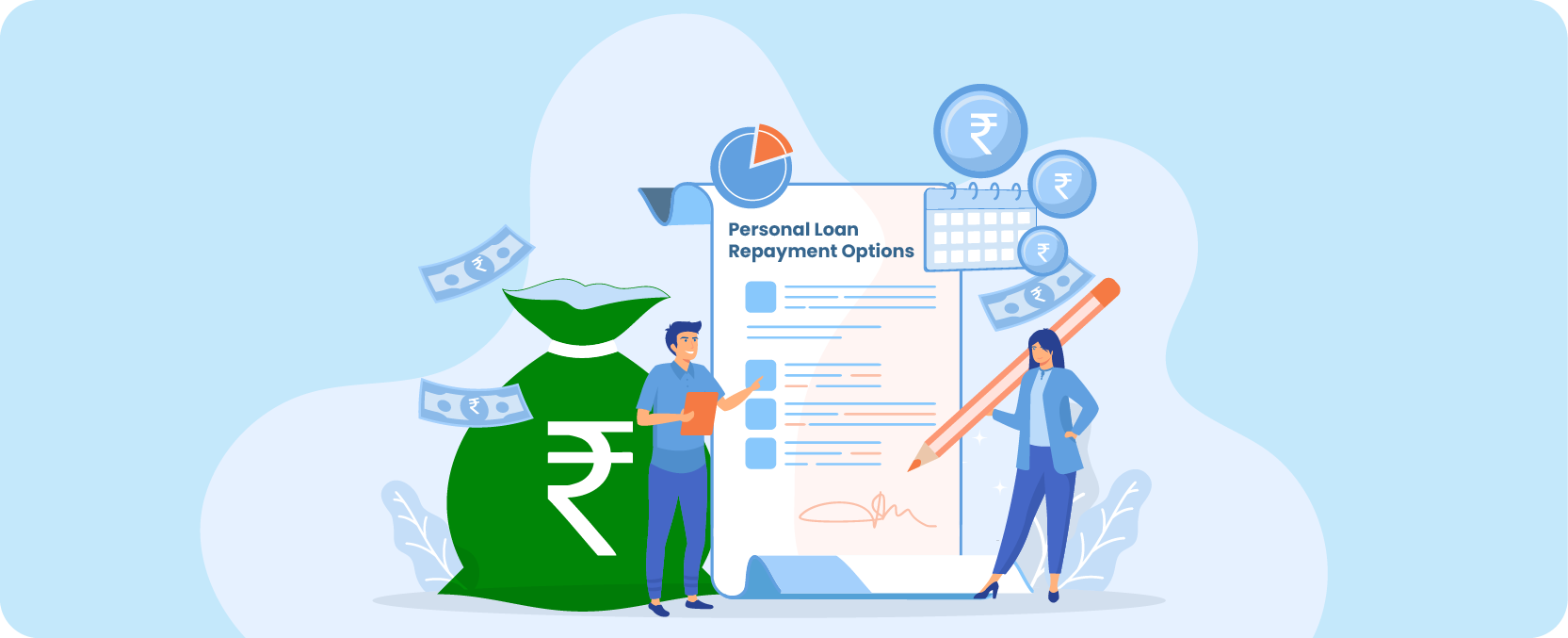- Published on: 20 Oct 2025
- Last updated on: 20 Oct 2025
- Post Views: 2751


A Personal Loan is one of the best ways to obtain funds urgently. However, you should never take a loan without knowing or figuring out how you’ll repay it. Knowing the various repayment options will help you prevent any financial troubles or debt traps.
There are a lot of Personal Loan repayment options that you can choose from. However, which repayment option is the best for your unique needs? In this blog, we’ll discuss everything you need to know about Personal Loan repayment options and help you make smart financial decisions.

Here are some of the most common personal loan repayment options available to borrowers in India:
In an EMI-based repayment, the borrower pays a fixed amount each month for the entire loan tenure. With each EMI, the total principal amount and the interest start getting lower over time.
In an EMI-based repayment plan, most of your initial monthly instalments go toward paying interest, while later payments gradually cover the principal amount. This method ensures smooth and predictable repayment since you know exactly how much to pay each month.
Why choose this option?
A step-up repayment schedule allows you to start with small EMIs and, over time, gradually increase the amount. This type of loan repayment is mostly used when borrowers expect that their income will rise during the course of the loan term.
For example, if you are at the beginning of your career or you are expecting promotions, this is the best option for you.
Why choose this option?
This is one of the best Personal Loan repayment options for young professionals who want flexibility.
In a step-down repayment plan, your instalments are high in the first few months and tend to reduce gradually over time. This type of repayment option is more suited for borrowers who currently have a stable and high income. And those who want to pay off the majority of the loan during the initial years.
Why choose this option?
In a bullet repayment system, you pay only the interest amount each month. Afterwards, you can repay the entire principal amount in a single instalment at the end of the tenure.
Although this method is not very common, it can be useful for borrowers who expect to receive a large sum of money in the future. It can be a bonus, the maturity of an investment, or proceeds from the sale of an asset.
Why choose this option?
This alternative requires financial discipline because the entire principal amount should be ready for payment at the end of the term. Nevertheless, it is one of the unique Personal Loan repayment options that can match your financial needs.
If you get some extra income all of a sudden, as a bonus, or investment returns, you should consider making an early loan repayment. Basically, you can do this in two ways:
Both these methods help you save money on interest. However, it is advisable to always confirm with your lender whether any prepayment charges will be applicable before you proceed.
Why choose this option?

The right repayment plan depends upon your income, job/business stability, and financial goals. Follow these tips to decide the right one for you:
Loan repayments are an important part of any Personal Loan or other types of loans; however, they don’t have to be complicated. Always choose a repayment plan that you are comfortable managing. You can opt for regular EMIs, step-up EMIs, step-down EMIs, or bullet repayment options. Regardless of the option you select, making a smart choice can help reduce stress and save money over the loan tenure.
Get the personal loan you need with flexible repayment options from DMI Finance. Apply now and manage your finances with ease and confidence. Connect with us today for more details!
1. Can I change my Personal Loan repayment option after taking the loan?
In general, changing the repayment plan in the middle of the loan period is not allowed. However, certain lenders may allow it under special circumstances.
2. Does choosing a longer repayment tenure reduce the total interest I pay?
Longer repayment tenure lowers your monthly instalment; however, it substantially increases the total interest that is payable over time.
3. What happens if I miss one EMI payment on my Personal Loan?
Even a single missed EMI can lead to penalties and damage your credit score.
4. Is prepaying my Personal Loan always a good idea?
Yes, it saves on interest; however, only if your lender’s prepayment charges don’t fully offset those savings.
5. Can I combine step-up or step-down repayment with auto-debit?
Yes, most financial institutions allow automatic payments even if your EMI amount changes during the tenure.
6. How does a balance transfer affect my credit score?
If done correctly, the credit score won’t be affected; rather, timely payments made to the new lender may lead to its improvement.
7. Can I switch from EMI-based repayment to bullet repayment later?
Generally, no. A bullet repayment is a distinct loan repayment option that must be chosen at the time of loan application and cannot usually be changed mid-tenure.
8. What if my salary date and EMI date don’t match?
You can request your lender to adjust the EMI date to better align with your salary schedule, making repayments more convenient. Approval is subject to the lender’s policies.
9. Do all lenders offer flexible Personal Loans?
Only a few banks and NBFCs (non-banking financial companies) offer such a product, mainly to clients with a steady income or business accounts.
10. How soon can I apply for a Personal Loan balance transfer?
Most lenders set a limit that one can apply for a balance transfer only after 6–12 EMIs have been paid on the current loan
| Personal Loan of Different Amounts | ||
| ₹50,000 Personal Loan | ₹1 lakh Personal Loan | ₹2 lakh Personal Loan |
| ₹3 lakh Personal Loan | ₹4 lakh Personal Loan | ₹5 lakh Personal Loan |


